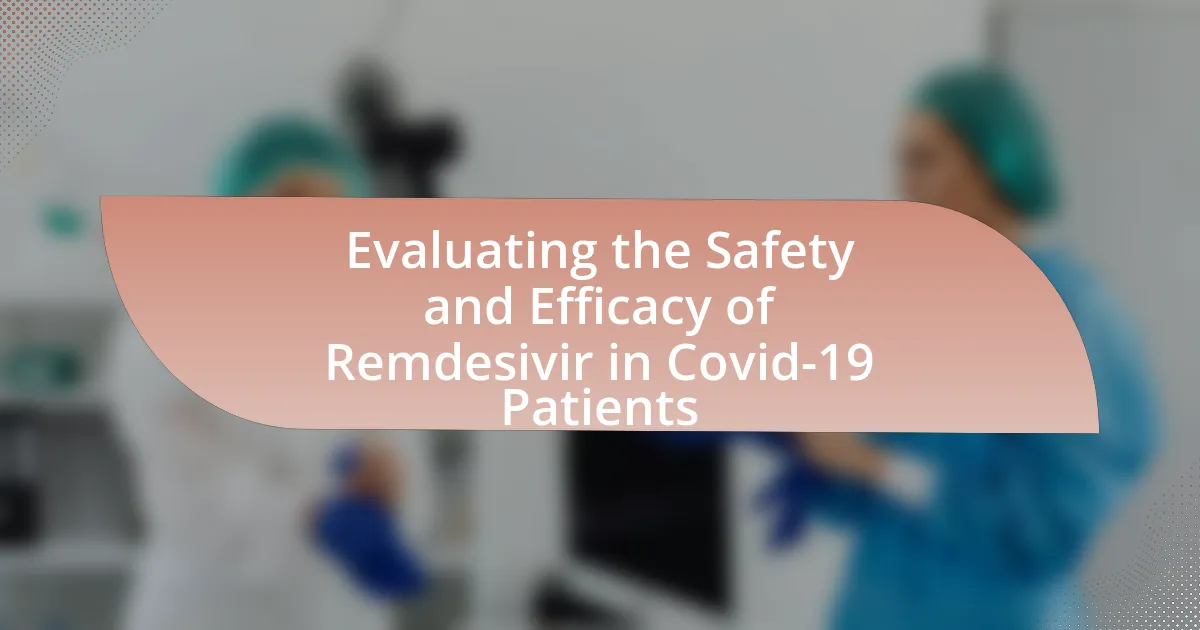Remdesivir is an antiviral medication authorized for emergency use in treating Covid-19, particularly in hospitalized patients requiring supplemental oxygen or mechanical ventilation. The article evaluates the safety and efficacy of Remdesivir, detailing its mechanism of action, pharmacokinetics, and clinical trial results that demonstrate its ability to shorten recovery time and improve clinical outcomes. It also discusses the recommended dosages, common side effects, and monitoring practices necessary for patients receiving the treatment, as well as the implications of these findings for clinical practice in managing Covid-19.

What is Remdesivir and its role in treating Covid-19?
Remdesivir is an antiviral medication that has been authorized for emergency use in treating Covid-19. It works by inhibiting the replication of the SARS-CoV-2 virus, which causes Covid-19, thereby reducing the viral load in patients. Clinical trials, such as the ACTT-1 study published in the New England Journal of Medicine, demonstrated that Remdesivir can shorten recovery time in hospitalized Covid-19 patients, particularly those requiring supplemental oxygen. The drug received emergency use authorization from the U.S. Food and Drug Administration (FDA) based on its efficacy in reducing the duration of illness and improving clinical outcomes.
How does Remdesivir function as an antiviral medication?
Remdesivir functions as an antiviral medication by inhibiting the RNA-dependent RNA polymerase enzyme, which is essential for viral replication. This mechanism disrupts the replication process of viruses, including SARS-CoV-2, the virus responsible for COVID-19. Clinical studies have demonstrated that Remdesivir can reduce the time to recovery in hospitalized COVID-19 patients, supporting its efficacy in treating the disease.
What is the mechanism of action of Remdesivir against SARS-CoV-2?
Remdesivir acts against SARS-CoV-2 by inhibiting the viral RNA-dependent RNA polymerase, which is essential for viral replication. This inhibition prevents the virus from synthesizing its RNA, thereby halting the replication process. Studies have shown that Remdesivir is a prodrug that gets converted into its active form, which mimics adenosine triphosphate (ATP) and gets incorporated into the viral RNA, leading to premature termination of the RNA chain. This mechanism has been validated in clinical trials, demonstrating reduced time to recovery in COVID-19 patients treated with Remdesivir compared to those receiving standard care.
What are the pharmacokinetics of Remdesivir in Covid-19 patients?
The pharmacokinetics of Remdesivir in COVID-19 patients involve its absorption, distribution, metabolism, and excretion. After intravenous administration, Remdesivir is rapidly converted to its active metabolite, GS-441524, with a half-life of approximately 1 hour. Peak plasma concentrations of Remdesivir occur within 30 to 120 minutes post-infusion. The volume of distribution is about 1 L/kg, indicating extensive tissue distribution. Remdesivir is primarily metabolized by the liver, and its elimination occurs mainly through renal excretion, with approximately 74% of the dose recovered in urine as metabolites. These pharmacokinetic properties support its therapeutic use in treating COVID-19, as evidenced by clinical studies demonstrating its efficacy in reducing recovery time in hospitalized patients.
What are the indications for using Remdesivir in Covid-19 treatment?
Remdesivir is indicated for the treatment of COVID-19 in hospitalized patients who require supplemental oxygen, invasive mechanical ventilation, or extracorporeal membrane oxygenation (ECMO). Clinical trials, such as the ACTT-1 study, demonstrated that Remdesivir can shorten recovery time in patients with severe COVID-19, supporting its use in these specific circumstances. The FDA granted Emergency Use Authorization for Remdesivir based on evidence showing its efficacy in reducing the duration of hospitalization and improving clinical outcomes in patients with moderate to severe disease.
Which patient populations are most likely to benefit from Remdesivir?
Patients with severe COVID-19, particularly those requiring supplemental oxygen or mechanical ventilation, are most likely to benefit from Remdesivir. Clinical trials, such as the ACTT-1 study, demonstrated that Remdesivir significantly reduced the time to recovery in hospitalized patients with advanced disease. Additionally, patients with underlying health conditions, such as diabetes or cardiovascular disease, may also experience improved outcomes when treated with Remdesivir, as evidenced by data showing enhanced recovery rates in these populations.
What are the recommended dosages for Remdesivir in Covid-19 patients?
The recommended dosage for Remdesivir in COVID-19 patients is 200 mg on the first day, followed by 100 mg once daily for the next 4 days, totaling a 5-day course. This dosing regimen is based on clinical trials that demonstrated the drug’s efficacy in reducing recovery time in hospitalized patients with severe COVID-19. The National Institutes of Health (NIH) guidelines support this dosing strategy, emphasizing its role in improving clinical outcomes.

What evidence exists regarding the safety of Remdesivir?
Evidence regarding the safety of Remdesivir indicates that it is generally well-tolerated in patients with COVID-19. Clinical trials, such as the ACTT-1 study published in the New England Journal of Medicine, demonstrated that serious adverse events occurred in 12% of patients receiving Remdesivir, which is comparable to the placebo group. Additionally, the FDA’s Emergency Use Authorization for Remdesivir was based on data showing that the drug did not significantly increase the risk of liver or kidney toxicity compared to standard care. Monitoring of patients during treatment has shown that while some mild to moderate side effects, such as nausea and headache, can occur, severe adverse reactions are rare.
What are the common side effects associated with Remdesivir?
Common side effects associated with Remdesivir include nausea, elevated liver enzymes, and infusion-related reactions. Clinical studies have reported these effects, with nausea occurring in approximately 5% of patients, elevated liver enzymes in about 10%, and infusion-related reactions in a small percentage of cases. These findings are based on data from trials assessing Remdesivir’s safety and efficacy in treating COVID-19, highlighting the importance of monitoring patients during treatment.
How do these side effects compare to other Covid-19 treatments?
The side effects of Remdesivir are generally milder compared to other Covid-19 treatments such as corticosteroids and monoclonal antibodies. While Remdesivir may cause nausea, headache, and liver enzyme elevations, corticosteroids like dexamethasone can lead to more severe complications, including increased risk of infections and gastrointestinal bleeding. Monoclonal antibodies, on the other hand, may cause allergic reactions and infusion-related reactions. Clinical studies indicate that the incidence of serious adverse events with Remdesivir is lower than those associated with corticosteroids and monoclonal antibodies, making it a safer option for many patients.
What monitoring is recommended for patients receiving Remdesivir?
Patients receiving Remdesivir should be monitored for renal function, liver function, and signs of infusion-related reactions. Specifically, renal function should be assessed through serum creatinine levels, while liver function should be monitored via liver enzyme tests. Additionally, healthcare providers should observe for any adverse reactions during the infusion, such as hypotension or allergic reactions. These monitoring practices are essential to ensure patient safety and to manage potential side effects effectively, as indicated in clinical guidelines and studies on the use of Remdesivir in COVID-19 treatment.
What clinical trials have assessed the safety of Remdesivir?
Clinical trials that have assessed the safety of Remdesivir include the ACTT-1 trial, which evaluated its efficacy and safety in hospitalized patients with COVID-19, and the SIMPLE trial, which focused on different dosing regimens of Remdesivir. The ACTT-1 trial, conducted by the National Institute of Allergy and Infectious Diseases, demonstrated that Remdesivir significantly reduced recovery time compared to placebo, indicating its safety profile in a controlled setting. The SIMPLE trial further confirmed the safety of Remdesivir across various treatment durations, providing additional evidence of its tolerability in patients with COVID-19.
What were the key findings from major studies on Remdesivir’s safety?
Major studies on Remdesivir’s safety have consistently indicated that it is generally well-tolerated among patients. In the ACTT-1 trial, which involved over 1,000 participants, adverse events were reported in 66% of patients receiving Remdesivir, similar to the 64% in the placebo group, suggesting no significant increase in overall adverse effects. Additionally, a study published in the New England Journal of Medicine highlighted that serious adverse events occurred in 12% of patients treated with Remdesivir, comparable to 15% in the placebo group. These findings support the conclusion that Remdesivir’s safety profile is comparable to standard care in COVID-19 patients.
How do the results of these trials inform clinical practice?
The results of trials evaluating the safety and efficacy of Remdesivir in COVID-19 patients inform clinical practice by providing evidence-based guidelines for treatment protocols. Specifically, these trials demonstrate that Remdesivir can reduce the time to recovery in hospitalized patients, which is crucial for optimizing patient management and resource allocation in healthcare settings. For instance, the ACTT-1 trial, published in the New England Journal of Medicine, found that patients receiving Remdesivir had a median recovery time of 10 days compared to 15 days for those receiving a placebo, thus supporting its use as a standard treatment option. This data enables clinicians to make informed decisions regarding the initiation of antiviral therapy, ultimately improving patient outcomes and enhancing the overall effectiveness of COVID-19 treatment strategies.

What evidence exists regarding the efficacy of Remdesivir?
Remdesivir has demonstrated efficacy in treating COVID-19, particularly in reducing recovery time for hospitalized patients. The Adaptive COVID-19 Treatment Trial (ACTT-1), conducted by the National Institute of Allergy and Infectious Diseases, found that patients receiving Remdesivir had a median recovery time of 10 days compared to 15 days for those receiving a placebo. Additionally, a study published in the New England Journal of Medicine indicated that Remdesivir significantly improved clinical outcomes in patients with severe COVID-19, leading to a faster recovery and a lower risk of progression to mechanical ventilation or death. These findings support the use of Remdesivir as a therapeutic option for COVID-19 patients.
How effective is Remdesivir in reducing Covid-19 severity and mortality?
Remdesivir is effective in reducing the severity and mortality of Covid-19, particularly in hospitalized patients requiring supplemental oxygen. Clinical trials, such as the ACTT-1 study published in the New England Journal of Medicine, demonstrated that Remdesivir shortened recovery time by approximately 31% compared to placebo, indicating its role in improving clinical outcomes. Additionally, a meta-analysis found that Remdesivir was associated with a reduction in mortality rates among severe Covid-19 cases, further supporting its efficacy in managing the disease.
What metrics are used to measure the efficacy of Remdesivir in clinical trials?
The efficacy of Remdesivir in clinical trials is primarily measured using metrics such as time to recovery, clinical improvement, mortality rates, and viral load reduction. Time to recovery is assessed by the number of days until a patient no longer requires supplemental oxygen or hospitalization. Clinical improvement is evaluated through changes in clinical status on a predefined scale. Mortality rates are tracked to determine the percentage of patients who die during the trial period. Viral load reduction is measured through quantitative PCR tests to assess the decrease in viral RNA levels in patients. These metrics provide a comprehensive evaluation of Remdesivir’s effectiveness in treating COVID-19.
What are the comparative efficacy results of Remdesivir versus placebo?
Remdesivir has shown superior efficacy compared to placebo in treating COVID-19 patients. In clinical trials, such as the ACTT-1 study published in the New England Journal of Medicine, patients receiving Remdesivir had a median recovery time of 10 days, compared to 15 days for those on placebo. Additionally, the trial indicated that Remdesivir treatment was associated with a 31% improvement in time to recovery. These results demonstrate that Remdesivir significantly reduces the duration of illness in COVID-19 patients compared to placebo.
What factors influence the efficacy of Remdesivir in Covid-19 patients?
The efficacy of Remdesivir in Covid-19 patients is influenced by several factors, including the timing of administration, the severity of the disease, and the patient’s overall health status. Early administration of Remdesivir, particularly within the first ten days of symptom onset, has been shown to improve outcomes, as evidenced by the ACTT-1 trial, which demonstrated that patients receiving the drug early had a shorter recovery time compared to those who received it later. Additionally, patients with moderate to severe Covid-19 tend to benefit more from Remdesivir than those with mild cases, as indicated by clinical studies that highlight its effectiveness in reducing the duration of hospitalization in more severely affected individuals. Lastly, underlying health conditions, such as obesity or diabetes, can affect the drug’s efficacy, as these conditions may complicate the disease course and response to treatment.
How does the timing of administration affect Remdesivir’s efficacy?
The timing of administration significantly affects Remdesivir’s efficacy, with earlier treatment correlating to better clinical outcomes. Studies indicate that initiating Remdesivir within the first 10 days of symptom onset leads to improved recovery rates and reduced mortality in COVID-19 patients. For instance, a clinical trial published in the New England Journal of Medicine demonstrated that patients receiving Remdesivir within this timeframe experienced a shorter time to recovery compared to those treated later. This evidence underscores the importance of timely intervention in maximizing the therapeutic benefits of Remdesivir.
What role do patient characteristics play in the effectiveness of Remdesivir?
Patient characteristics significantly influence the effectiveness of Remdesivir in treating COVID-19. Factors such as age, underlying health conditions, and the severity of the disease at the time of treatment initiation can affect patient response to the antiviral drug. For instance, clinical studies have shown that older patients and those with comorbidities, such as diabetes or cardiovascular diseases, may experience different outcomes compared to younger, healthier individuals. A study published in the New England Journal of Medicine indicated that patients with severe COVID-19 who received Remdesivir showed improved recovery times, particularly when treated early in the disease course. This evidence underscores the importance of tailoring treatment approaches based on individual patient profiles to optimize the therapeutic benefits of Remdesivir.
What are the implications of Remdesivir’s safety and efficacy for clinical practice?
Remdesivir’s safety and efficacy have significant implications for clinical practice, particularly in the treatment of COVID-19. The drug has been shown to reduce the time to recovery in hospitalized patients, as evidenced by a study published in the New England Journal of Medicine, which reported a median recovery time of 10 days compared to 15 days for those receiving a placebo. Additionally, the safety profile of Remdesivir indicates that it is generally well-tolerated, with adverse effects being relatively rare and manageable. This combination of efficacy in shortening recovery time and a favorable safety profile supports its use as a standard treatment option for COVID-19, guiding clinicians in making informed decisions about patient care.
How should healthcare providers approach the use of Remdesivir in treatment protocols?
Healthcare providers should approach the use of Remdesivir in treatment protocols by adhering to established guidelines that recommend its use for hospitalized COVID-19 patients requiring supplemental oxygen or mechanical ventilation. Clinical trials, such as the ACTT-1 study published in the New England Journal of Medicine, demonstrated that Remdesivir significantly reduced recovery time in patients with severe COVID-19, supporting its inclusion in treatment protocols. Additionally, providers should monitor for potential side effects, such as liver enzyme elevation, and adjust treatment based on patient response and clinical status.
What best practices should be followed when administering Remdesivir to Covid-19 patients?
The best practices for administering Remdesivir to Covid-19 patients include ensuring the patient meets the eligibility criteria, monitoring renal function, and administering the drug intravenously over a period of 30 to 120 minutes. Patients should be assessed for contraindications, such as severe liver impairment, and baseline liver and renal function tests should be conducted prior to treatment initiation. Continuous monitoring for adverse effects, particularly infusion-related reactions, is essential during administration. The recommended dosage is 200 mg on the first day, followed by 100 mg daily for up to 5 to 10 days, depending on clinical response. These practices are supported by clinical guidelines from the National Institutes of Health, which emphasize the importance of careful patient selection and monitoring to optimize treatment outcomes.


